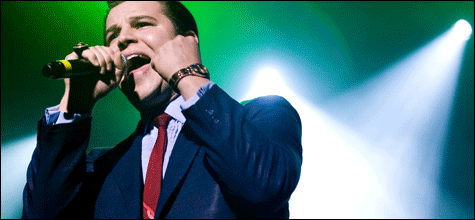
Eli “Paperboy” Reed seems dubious about my following him for a few hours before and after his five o’clock Lollapalooza show in Chicago’s Grant Park last Sunday. “I’m not doing anything,” he says, looking up from two girls he’s chatting to as I walk up. I dispel his fears that I’m looking to play Rock Band with an up-and-coming R&B star. If he wants, we can just have a quick chat.
Reed says goodbye quickly and we’re off to his band the True Loves’ dressing room. But we’re inside just long enough to compliment the A/C — God’s gift to August — when he observes we’ve only 20 minutes to snag grub from the buffet. We’re up again and moving.
Actually, Eli Reed seems dubious about my being able to write an interesting article about him at all. While I’m eating lunch with him and the True Loves, he keeps asking, “What’s this article about again?”, his eyebrows raised over rectangular, bank-teller glasses that he eschews during performances. It’s no wonder — pretty much anything written on the guy (a) calls him a Jewish kid from Massachusetts or (b) compares him with any number of soul legends from the ’60s or (c) calls him a Jewish (!) kid (!!) from Massachusetts who likes gospel music (!!R.U.F’NKIDDING?!?!). Yet according to Eli, the Dutch have US writers beat with the compact headline: “Courageous Jew Guy Knows What To Do With Jesus Music.”
“So, what’s this article about again?” I tell him I’ve been thinking about Monterey Pop, the difference between . . .
“Otis! And I’m gonna be Otis! Say this [hands up and swooping for emphasis]: ‘ELI REED SAYS HE’S BETTER THAN OTIS!’ Say that, put that in the article.” The band and I giggle, and for a second I zone out thinking about Otis Redding at the Monterey Pop Festival singing “I’ve Been Loving You.” Shot on 16mm, D.A. Pennebaker’s famous footage of the performance catches Otis from the back during part of this song, the 25-year-old (six months from death) bending and swaying, his body fighting against (reaching out to?) an insistent spotlight that cuts his silhouette and overtakes the frame, blinding the viewer.
“I mean, obviously, Monterey was important because it was the moment that all these boundaries came down.” Musical boundaries, Eli means, the moment when the folk festivals and the rock festivals and the country festivals and the soul festivals and whatever genre we’re putting Ravi Shankar in came together and decided to be one big lollapalooza.
In the Monterey Pop movie, you get to see those boundaries coming down in the eyes of the musicians watching one another. Jimi’s bug eyes on Shankar’s fingers. Janis’s schoolgirl smile underneath those dippy glasses during Otis’s hangdog patter.
Now it’s later and we’re all sitting eating burritos while the John Butler Trio play 40 feet away. We’re rolling our eyes while playing air guitar, mimicking the jam band’s wah-wah fixation.
I suggest that, if not musical boundaries, at least interpersonal boundaries seem to have built themselves up again among musicians, at least on the festival circuit. Reed responds: “If something catches my ears, I’ll check it out. But what we do is just a little more direct — we just set up and play, the music is just what comes out.” A no-wah-wah zone, if you will. “We’re lucky, too, there’s a ton of us in the band, we’ve got a little microcosm of musical debate within our group — that’s what keeps us on our toes.” And sure enough, later on, Reed and guitar player Ryan Spraker watch Wilson Pickett sing “Deborah” on YouTube and take notes: “He’s got two microphones. . . . Look at his hair. . . . He’s got two bari-sax players?”
I’m dubious as to whether all the different microcosms of the 70 or so bands at Lollapalooza are mingling in a progressive way, one that looks past merely sharing a festival bill — though I do hear a Radiohead cover from Gnarls Barkley. Still, Eli “Paperboy” Reed and the True Loves are a sight. From backstage I watch the horn players twist and Eli shake and roll. Up above and beyond him there’s a row of trees bent into a long archway that eclipses the sun and protects us from the light. Reed’s voice soars into hoarse hollers, rich with harmonic texture — and soul. “Courageous Jew Guy Really Does Know What To Do With Jesus Music.”